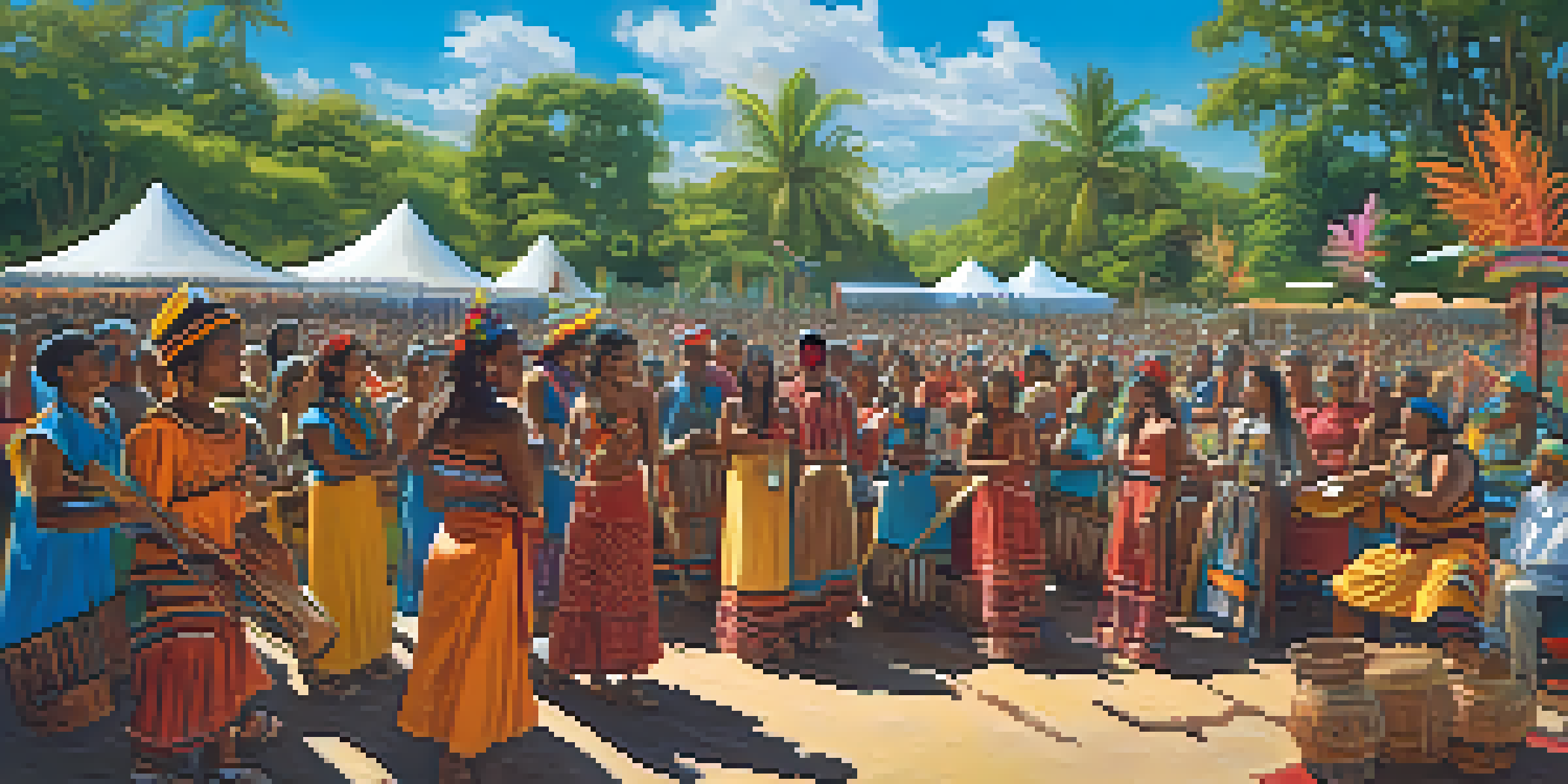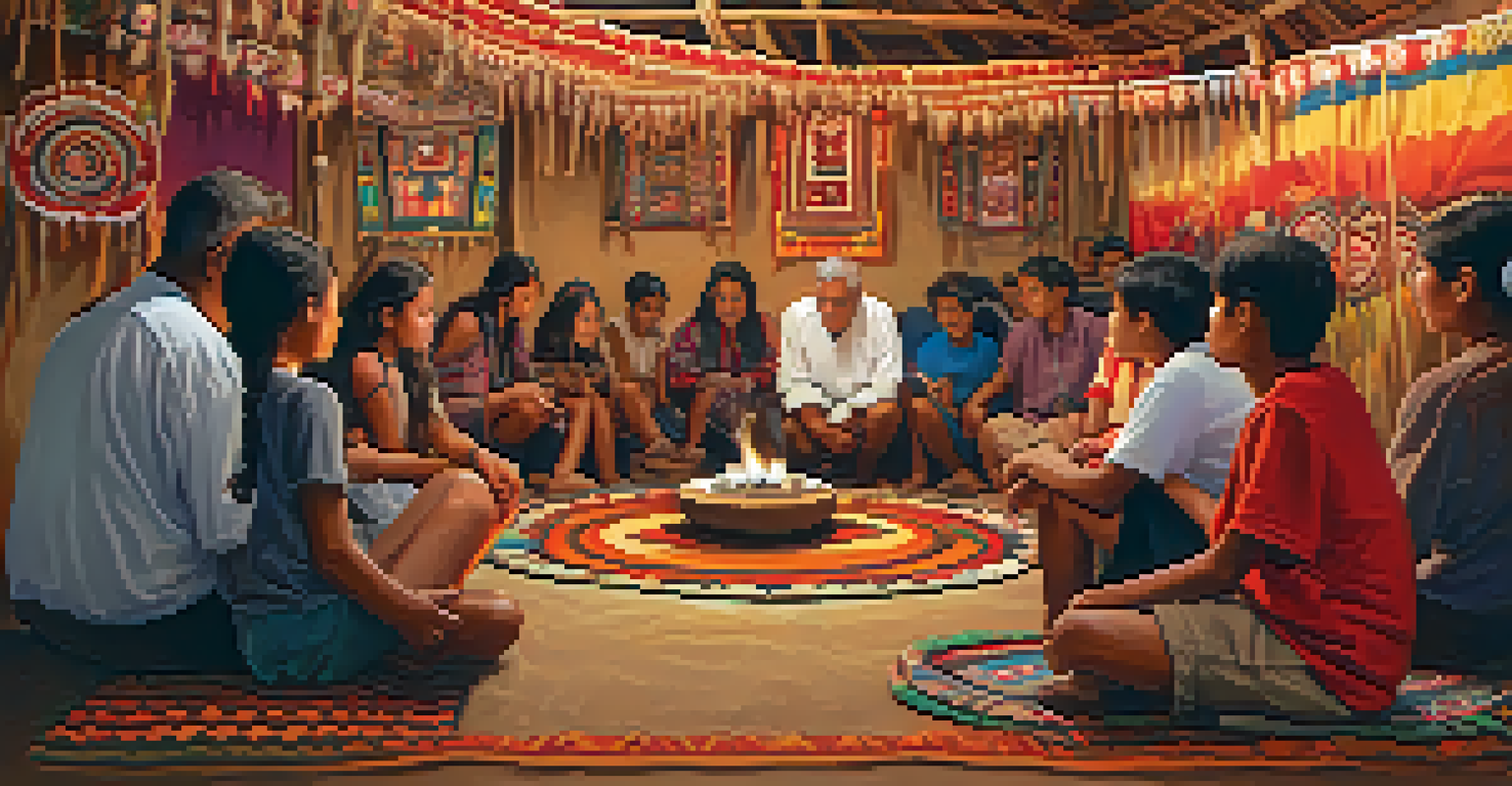The Significance of Music Festivals in Indigenous Cultures

Music Festivals as Cultural Expressions in Indigenous Communities
Music festivals serve as vibrant expressions of Indigenous culture, showcasing traditional songs, dances, and stories. These events are not just entertainment; they are a celebration of identity and heritage. Through music, Indigenous peoples convey their history, values, and beliefs, creating a sense of belonging within the community.
Music is the shorthand of emotion.
For many Indigenous groups, these festivals are a way to pass down traditions to younger generations. They offer a space where elders can share their knowledge and experiences, ensuring that cultural practices remain alive. This intergenerational exchange fosters a deep appreciation for Indigenous heritage among youth.
Additionally, music festivals bring communities together, strengthening social ties. They create opportunities for collaboration and unity, as people from different backgrounds come together to celebrate. This collective experience reinforces the importance of community solidarity in Indigenous cultures.
Healing and Spiritual Significance of Music Festivals
Many Indigenous music festivals hold deep spiritual significance, often serving as a form of healing for individuals and communities. Music is seen as a conduit for connecting with ancestors and the spiritual world, providing comfort and guidance. This connection can be especially vital in times of grief or loss.

Through songs and rituals performed at these festivals, participants can engage in healing practices that address emotional and spiritual needs. The communal aspect of these gatherings amplifies this healing effect, as shared experiences foster support and understanding among attendees.
Cultural Heritage Through Music Festivals
Indigenous music festivals celebrate and preserve cultural identity by showcasing traditional songs, dances, and stories.
Moreover, the presence of nature during these festivals enhances the spiritual experience. Many Indigenous cultures emphasize the relationship with the land, and music festivals often take place in natural settings, reinforcing the connection between culture, music, and the environment.
Economic Impact of Indigenous Music Festivals
Beyond cultural significance, Indigenous music festivals can have a substantial economic impact on local communities. These events attract visitors, boosting tourism and generating revenue for local businesses. From food vendors to artisans selling crafts, many community members benefit from the influx of attendees.
The earth has music for those who listen.
Furthermore, the festivals provide job opportunities, from event planning and management to security and hospitality. This economic activity can lead to greater investment in local infrastructure and services, creating a positive feedback loop for community development.
However, it’s crucial to ensure that the economic benefits are equitably shared among the community. Transparency and collaboration among festival organizers and community members can help foster an inclusive approach that prioritizes the needs of Indigenous peoples.
Preservation of Language Through Music Festivals
Indigenous music festivals play a key role in the preservation and revitalization of Indigenous languages. Many songs performed at these events are sung in native languages, creating a living repository of linguistic heritage. This not only helps keep the language alive but also promotes its importance within the community.
By incorporating language into music, festivals provide a fun and engaging way for younger generations to learn. Singing in their native tongue fosters pride and encourages the use of the language in everyday life. This is particularly critical in the face of language endangerment issues facing many Indigenous communities.
Economic Benefits for Communities
These festivals boost local economies by attracting visitors and creating job opportunities while promoting equitable benefit sharing.
Moreover, language workshops often accompany these festivals, allowing attendees to deepen their understanding of the language. These educational initiatives highlight the importance of language as a vital component of cultural identity.
Fostering Global Awareness of Indigenous Issues
Indigenous music festivals are powerful platforms for raising awareness about the challenges faced by Indigenous communities. By showcasing their art and culture, these events educate attendees on issues such as land rights, environmental protection, and social justice. This exposure can foster empathy and understanding among diverse audiences.
Many festivals include discussions, workshops, and performances that tackle these critical topics head-on. By engaging both Indigenous and non-Indigenous participants in meaningful dialogue, festivals can spark important conversations that extend beyond the event itself.
Additionally, partnerships with advocacy groups can amplify the message of these festivals. Collaborating with organizations working towards Indigenous rights enhances the impact of the festivals, encouraging attendees to become allies and advocates for change.
Role of Technology in Modern Indigenous Music Festivals
As technology evolves, so do Indigenous music festivals, which are increasingly incorporating digital elements. Live streaming performances and utilizing social media platforms allow festivals to reach a broader audience, extending their cultural impact beyond geographical boundaries. This modern approach helps connect Indigenous peoples worldwide, fostering a sense of global community.
Moreover, technology can enhance the festival experience for attendees. Mobile apps can provide schedules, artist bios, and interactive maps, making it easier for participants to navigate the event. This integration of technology not only modernizes festivals but also attracts younger audiences who are tech-savvy.
Raising Awareness on Indigenous Issues
Music festivals serve as platforms to educate attendees about Indigenous challenges, fostering empathy and advocacy for change.
However, it’s essential to balance technology with tradition. Many Indigenous communities emphasize the importance of maintaining cultural authenticity, ensuring that digital elements do not overshadow the core values and practices that define their music festivals.
The Future of Indigenous Music Festivals
Looking ahead, the future of Indigenous music festivals appears promising, as they continue to evolve and adapt to contemporary society. Increased visibility and recognition of Indigenous cultures can lead to more opportunities for collaboration and support from various sectors. This momentum is crucial for sustaining and growing these cultural events.
Innovative approaches, such as hybrid festivals that combine in-person and virtual elements, may become more common. This flexibility can ensure accessibility for those who may not be able to attend in person, further enriching the community’s reach and impact.

Ultimately, the enduring significance of these festivals lies in their ability to adapt while staying true to their roots. By embracing change and fostering inclusivity, Indigenous music festivals can continue to be a vital force in preserving and celebrating Indigenous cultures for generations to come.